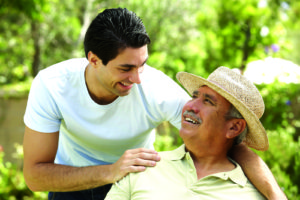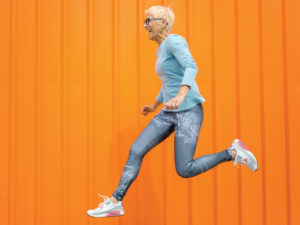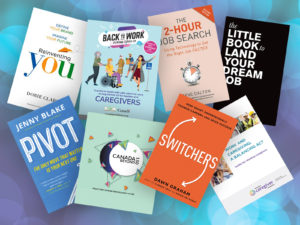Unreliable and false information is spreading around the world to such an extent that some commentators are now referring to the new avalanche of misinformation that’s accompanied the COVID-19 pandemic as a “disinfodemic”. With help from our experts and trusted sources, we’ve taken a look at some of the common myths that are circulating.
BY STEPHEN TRUMPER
MYTH: A vaccine to cure COVID- 19 is now readily available.
FALSE. There is no known cure or vaccine for the new coronavirus right now. Scientists around the world have already begun developing a vaccine that is safe and effective in human beings but expect it will take many months or, possibly, years.
MYTH: You can protect yourself from COVID-19 by injecting, swallowing, rubbing onto your skin, or bathing in disinfectants or rubbing alcohols on to your body. Gargling with saltwater or heating your nasal passage will also eliminate the virus.
FALSE. Let us be clear, there is no known cure for coronavirus. Scientists are trying to find treatments and vaccines for the virus, and health care professionals are working to stop the spread of misinformation. Many of the suggested products are highly toxic and should never be swallowed or injected. Call 911 if this has occurred. Of note: hard-surface disinfectants and hand sanitizers with evidence for use against COVID-19 can be found at https://www.canada.ca/en/health-canada/services/drugs-health-products/disinfectants/covid-19/list.html.
MYTH: COVID-19 is just another flu.
FALSE. The flu takes thousands of lives each year but COVID-19 has already exceeded those numbers. Given the fact that we have a vaccine and greater awareness of the flu, it makes it a) more understood and b) more manageable for both individuals and health professionals. However, while the flu and COVID-19 both cause respiratory illness, COVID-19 affects humans in more ways, is more deadly and often leaves survivors with lasting organ damage.
MYTH: Rinsing my child’s nose with saline solution will help prevent coronavirus infection.
FALSE. There is no evidence that regularly rinsing with saline solution protects your little one from respiratory infections such as the coronavirus. However, regularly rinsing their nose with saline solution can help them recover from a common cold.
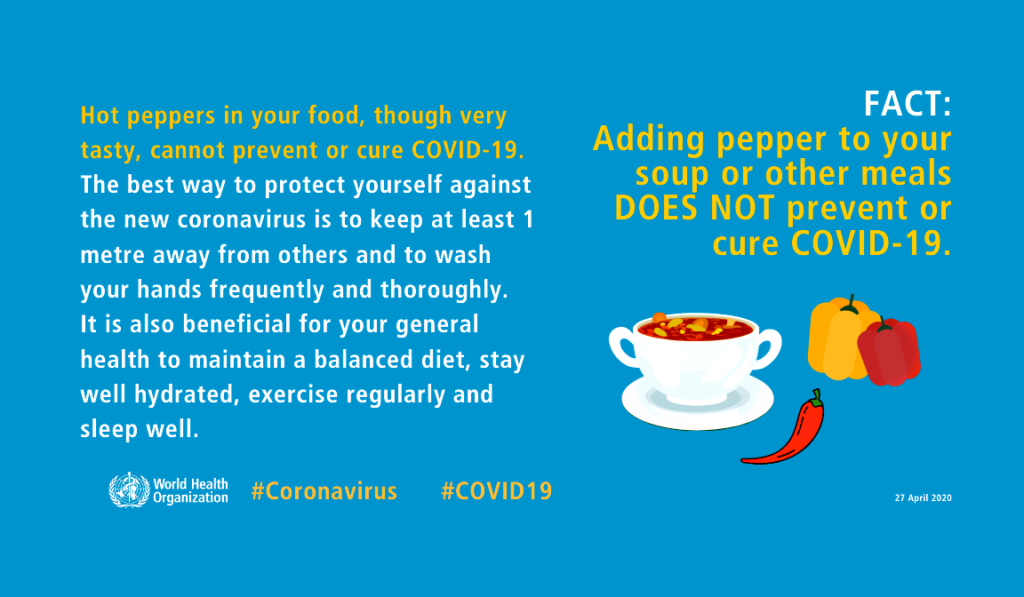
MYTH: Giving my child a hot bath will help prevent coronavirus.
FALSE. Giving a hot bath to your little one will not prevent them from catching the virus. Their body temperature stays at 36.5°C to 37°C, regardless of the temperature of the bath or shower. Also, be careful when giving a hot bath, because very hot water is harmful to your child.
MYTH: Coronavirus doesn’t affect children and infants.
FALSE. People of all ages can be infected with the coronavirus. Older people, and people with pre-existing medical conditions (such as asthma, diabetes, heart disease) appear to be more vulnerable to becoming severely ill from the virus.
MYTH: COVID-19 only affects older people who are living in nursing homes. Young people and kids are safe.
FALSE. While most people with COVID-19 develop mild or uncomplicated illness, World Health Organization (WHO) reports that about 14 per cent of people infect- ed to date have developed severe disease and need to be hospitalized. Five per cent of these cases end up in an intensive care unit. Although older people, people living with disabilities or chronic medical conditions and those who are immunosuppressed are at greatest risk for complications, younger Canadians aren’t entirely safe. In fact, as of June 8, 2020, the Public Health Agency of Canada has reported the number of young people under 40 account for 34 per cent of cases.
MYTH: Social media does not provide good advice on COVID-19.
FALSE. There is a lot of misinformation on social media, but some social sites have good information. Our trusted sources for COVID-19 information include: The Government of Canada and the World Health Organization (WHO) and Provincial Ministries of Health.
MYTH: Antibiotics are effective in preventing and treating COVID-19.
FALSE. COVID-19 is a virus so antibiotics will not prevent or treat it. Antibiotics do not work against viruses, only bacteria. If you are hospitalized for COVID-19, you may receive antibiotics because bacterial co-infection is possible.
MYTH: Cold weather and snow can kill the coronavirus.
FALSE. There is no reason to believe that cold or warm weather can kill COVID-19. The normal human body temperature remains around 36.5°C to 37°C, regardless of the external temperature or weather so the risks stay the same. What we do know is that being outside and practicing social distancing is recommended over staying inside wherever possible.
MYTH: You can’t catch COVID-19 if you are wearing gloves and a mask.
FALSE. The virus that causes COVID-19 is mainly transmitted through droplets generated when an infected person coughs, sneezes or speaks. These droplets are too heavy to hang in the air. They quickly fall on floors or outdoor surfaces. You can be infected by breathing in the virus if you are within 1 metre of a person who has COVID-19, or by touching a contaminated surface and then touching your eyes, nose or mouth before washing your hands. Wearing a mask is recommended because it will reduce your risk.
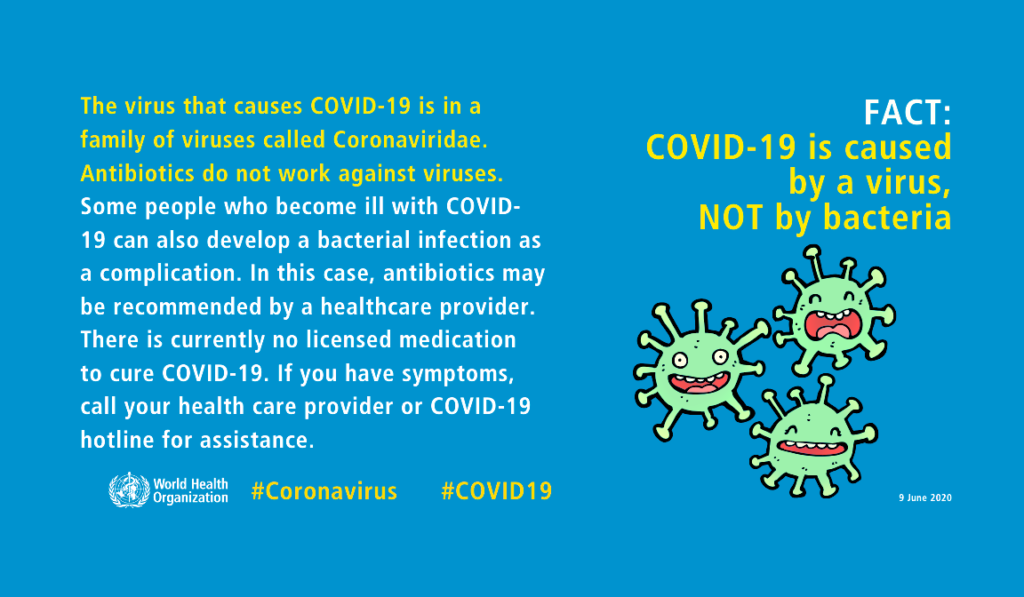
MYTH: Getting the coronavirus means you will have it for life.
FALSE. Most of the people who get COVID-19 have a mild case and will recover. If you have a cough, fever, and difficulty breathing, seek medical care early—but call your health facility by telephone first. However, some patients are seeing long term damage to their organs, loss of smell and sensation and other side effects even after they officially recover. The jury is still out on whether you can get COVID-19 more than once.
MYTH: Being able to hold your breath for 10 seconds or more without coughing means you don’t have COVID-19, or any other lung disease.
FALSE. The most common symptoms of COVID-19 are dry cough, tiredness and fever. Others include aches and pains, sore throat, diarrhoea, conjunctivitis, headache, loss of taste or smell, a rash on skin, or discolouration of fingers or toes. Some people may develop more severe forms of the disease, such as pneumonia. Testing is the only way to officially confirm and deny your infection.
MYTH: Pets can spread COVID-19.
FALSE. Currently, there is no evidence to suggest pets can spread COVID-19 to humans. However, according to one report in Hong Kong, a Pomeranian whose owner had COVID-19 also contracted the virus. The dog did not display any symptoms. Scientists are debating the importance of this case to the outbreak. For instance, Prof. Jonathan Ball, a professor of molecular virology at the University of Nottingham in the United Kingdom, says:
“We need to find out more, but we don’t need to panic—I doubt it could spread to another dog or a human because of the low levels of the virus. The real driver of the outbreak is humans.”
MYTH: Parcels and home deliveries can spread COVID-19.
FALSE. From previous research into similar coronaviruses, including those that cause SARS and MERS, scientists believe the virus cannot survive on letters or packages for an extended period of time. The CDC explains that “because of poor survivability of these coronaviruses on surfaces, there is likely very low risk of spread from products or packaging that are shipped over a period of days or weeks at ambient temperatures.” If you want to
be on the safe side, leave the package outside or in a staging area before bringing it into your house. Or, use a disinfectant wipe to carefully clean the package.
MYTH: COVID-19 can spread through human stool.
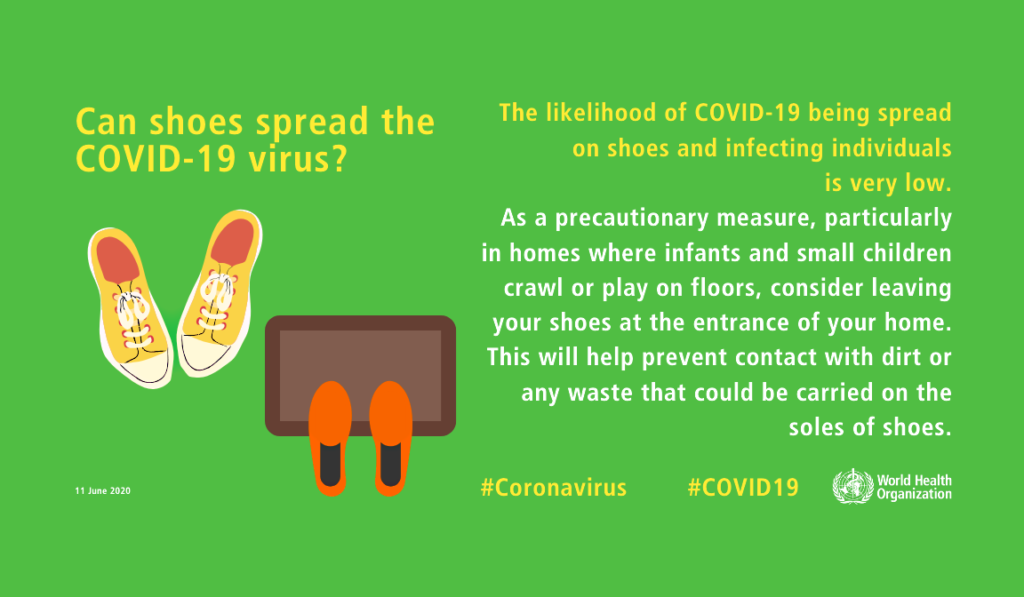
FALSE. When you are taking care of someone who might have COVID-19, you need to protect yourself against airborne drops from a cough, sneeze and normal breathing. Although viral samples have been found in the stool of infected patients, transmission risk is low. It is not yet known whether COVID-19 is viable in other bodily fluids like vomit or urine.
MYTH: The prolonged use of medical masks when properly worn, DOES NOT cause CO2 intoxication nor oxygen deficiency.
TRUE. The prolonged use of medical masks* can be uncomfortable. However, it does not lead to CO2 intoxication nor oxygen deficiency. While wearing a medical mask, make sure it fits properly and that it is tight enough to allow you to breathe normally. Do not re-use a disposable mask and always change it as soon as it gets damp.
*Medical masks (also known as surgical masks) are flat or pleated; they are affixed to the head with straps or have ear loops.
MYTH: 5G mobile networks can spread COVID-19.
FALSE. Viruses cannot travel on radio waves/mobile networks. COVID-19 is spreading in many countries that do not have 5G mobile networks.
MYTH: The new coronavirus CANNOT be transmitted through mosquito bites or houseflies.
TRUE. To date there has been no information nor evidence to suggest that the new coronavirus could be transmitted by mosquitoes.
MYTH: Are hand dryers or ultra- violet (UV) lamps effective in killing the new coronavirus?
FALSE. Hand dryers are not effective in killing COVID-19. Ultra-violet (UV) lamps should not be used to disinfect hands or other areas of your skin, as UV radiation can cause skin irritation and damage your eyes.
Stephen Trumper serves on the board of the Canadian Abilities Foundation. He is an independent writer and editor. He is also a journalism instructor at Ryerson University.
Sources: Health Canada; John Hopkins Medicine; Healthline; Mayo Clinic; Government of North- west Territories; health24; Canadian Digestive Health Foundation; World Health Organization.


